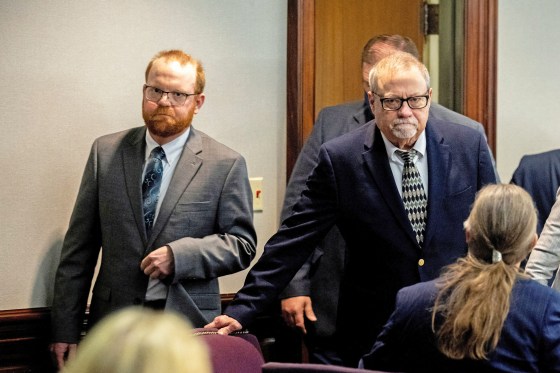Before the defense and prosecution rested their cases on Friday in the federal hate crime trial of the three white men convicted of killing Ahmaud Arbery, a Black man, the jury had heard several witnesses testify about racist and discriminatory remarks and rants two of the men had made.
Father and son, Greg and Travis McMichael, and their neighbor, William "Roddie" Bryan," chased Arbery, 25, through their coastal Georgia neighborhood in trucks after spotting him running by their homes in February 2020. The three men cornered Arbery, and Travis McMichael fatally shot him with a shotgun.
While all three men were convicted of murder in a state trial in November, the federal hate crime trial seeks to establish that their crime was motivated by racial bias. Prosecutors have focused on building a foundation to support their claim that Arbery's killing was the result of prejudices the men carried about Black people, a motive that prosecutors in the state trial largely avoided.
Earlier in the week, an FBI analyst who had combed through messages and social media posts from the men, testified about the racist slurs and views they had shared in the years before the murder.
On Friday, prosecutors called several witnesses who had had conversations with the McMichaels in which they expressed racial bias and used slurs and other derogatory remarks to discuss Black people.
Kim Ballesteros, a former neighbor of the McMichaels family who had lived across the street from them, testified that on one of the occasions she ran into Greg McMichael after she had moved from the neighborhood, the two discussed their experiences with tenants.
Ballesteros testified that Greg McMichael disparaged a Black woman who had fallen behind on her rent, calling her "a big, fat, Black woman" and said that he and others often called the woman "the walrus" because the woman was "big and Black."
Ballesteros said the conversation made her uneasy, but she said Greg McMichael went further and claimed to have disconnected the woman's air conditioner when she did not pay her rent on time.
“You should've seen how fast her big Black ass came with the rent check,” Greg McMichael said, Ballesteros testified.
Travis McMichael's former boss also took the stand.
Joe Mandala worked with the younger McMichael at a small Georgia naval base at the time of Arbery's murder, where they worked on small boats. He testified that Travis McMichael openly admitted to shooting Arbery and seemed fine after the murder, beyond taking two days off.
Mandala testified that Travis McMichael said that he suspected Arbery of breaking into homes and claimed he had been attacked.
When the video of the murder surfaced months later, Mandala said he was shocked and upset, and he expressed surprise that Travis McMichael had not been arrested. After watching the video with colleagues, he testified that he'd reported it to their superiors in an effort to strip McMichael of his security passes and access to the facility, which took days without an arrest on record.
“Watching it was upsetting and what happened was upsetting,” Mandala said.
The prosecution then called a former colleague from Travis McMichael's time in the U.S. Coast Guard.
Kristie Ronquille, who still serves in the maritime force, told the jury that Travis McMichael had called her "an N-word lover” for having dated a Black man when she served under McMichael in Pascagoula, Mississippi, in 2011.
Ronquille began to cry while testifying, telling prosecutors it was the first time she'd ever heard something like that said. She said Travis McMichael also made sexual jokes about her dating history and Black men.
She said she feared reporting it at the time because she was "still green" and didn't know the resources available to her and because Travis McMichael was her superior.
Amy Lee Copeland, who is Travis McMichael's defense attorney, noted that Ronquille had told the FBI that she was only "90 percent" sure that he had used the racist slur. The attorney also noted that Ronquille had called him "crazy" and used a profanity to describe him during the interview.
Copeland, however, was unable to provide a recording or transcript of the exchange with the FBI.
The final witness the prosecution called was Carol Sears, who met Greg McMichael in 2015 after a court hearing for the district attorney's office in Glynn County, where the elder McMichael worked as an investigator until 2019.
A real estate agent in Larchmont, New York, Sears and her daughter had traveled to Georgia to attend a court hearing for the man who had killed her husband years earlier in a drunken-driving incident.
Sears said she at one point expressed her sadness that civil rights activist Julian Bond had died. She said she remembered that she called it "terrible" while Greg McMichael gave Sears and her daughter a ride to the airport.
"Terrible? I wish that guy had been in the ground years ago," Greg McMichael responded, Sears testified. "All these Blacks are nothing but trouble. I wish they all would die."
Sears said that McMichael then went on an anti-Black tirade for several minutes that carried "meanness and ugliness about a whole race of people." She and her daughter were shocked into silence for the rest of the drive and expressed feeling afraid.
The prosecution then rested, and the defense called a single witness on behalf of Greg McMichael. Evelyn Cofer, a longtime resident of Satilla Shores, where the McMichaels family lives, testified that she saw a white man under a nearby bridge who was suspected of breaking into local homes.
McMichael had previously called the police about the man, although the prosecution noted he called the nonemergency number for the police, pursued the matter with no urgency and did not respond in the way he did to Arbery running past his home.
The defense rested after Cofer's testimony. Attorneys for Travis McMichael and Bryan did not call any witnesses.
Closing arguments are scheduled for Monday.

